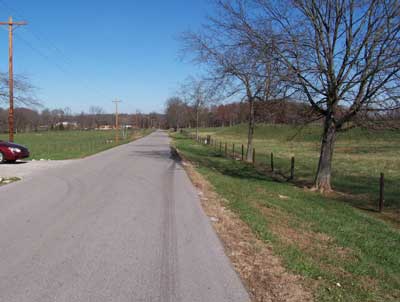Male Semi-Truck Driver Killed In Rollover Crash On County Road
Kentucky Case Report: 05KY008
Report Release Date: February 15, 2008
Summary
Early in the morning during the winter of 2005, a 31-year-old male semi-truck driver died when the semi-tractor trailer he was driving left the roadway and rolled over into a ditch. He had just picked up a load of raw lumber from a lumber yard and pulled out of the gate onto a county road and driven about a mile when the incident occurred. His destination was a lumber mill approximately 150 miles away. He was driving on a straight stretch of the road when the right tires left the pavement and dropped onto the sloped grassy area next to the road. There was evidence the driver attempted to correct the tractor trailer and return it to the pavement. However, the ground was wet and the slope was steep. The tractor trailer hit a tree and rolled over onto a fence. There were no witnesses to the incident. Emergency medical services were contacted. Upon arrival, they found the driver on the inside of the roof of the overturned, upside down cab without vital signs. The local coroner was contacted who arrived and declared the driver dead at the scene. He had not worn his seatbelt. Toxicology results showed acetaminophen, Doxylamine, and Dextromethorphan (cold medications) were in his system at the time of death.
 |
|
Photograph of county road where a semi-tractor trailer left the pavement and turned over. Grade is steeper than it appears in this photo.
|
To prevent future occurrences of similar incidents, the following recommendations have been made:
- Commercial vehicle carriers should implement and enforce a workplace policy that requires drivers to wear seat belts while operating a commercial vehicle.
- Employers should implement and enforce a policy that prohibits commercial drivers who are ill or taking over-the-counter medications with potential side effects for impaired driving from operating a commercial vehicle.
- Commercial vehicles should be in compliance with Department of Transportation regulations.
- Companies should provide professional training for company truck drivers.
- County roadways in Kentucky should be designed and constructed with an adequate shoulder area, or have guardrails that will deter commercial vehicle drivers from leaving the roadway.
- Transportation companies should consider equipping semis with global positioning satellite systems.
Background
The company the decedent was employed by was registered as an intrastate non-hazmat hauler that transported logs, poles, beams, and lumber. Including the owner, the company employed three individuals, and had been in business for approximately 4 years. The driver had worked for the company for approximately one year hauling loads of lumber and logs at least three times a week depending upon demand. When he hauled logs, depending upon the distance from the pickup point to the destination, he would make up to three trips a day. On days when he hauled lumber, he would make one trip if the destinations were further away. The driver always operated the same semi tractor, but hauled different trailers depending upon what he would be hauling that day. Primarily, he operated the routes from his residence; keeping the semi and trailers there. This reduced the driving distance and time on his routes. He hauled five days a week for the company. Previously, he had worked for another company for two years where he learned to drive a semi.
The owner discussed safety every day with his employees. Topics covered included procedures on how to safely load and unload lumber and logs, and what roadways to avoid. For instance, the driver had been instructed numerous times not to drive the road on which the incident occurred since it was only 18 feet wide. He had been instructed to take a wider, two lane road from the lumber yard to the highway. However, the driver preferred to drive the smaller road as it was a shorter distance from the lumber yard to the main highway.
Temperatures on the day of the incident ranged from 36 degrees Fahrenheit to 46 degrees Fahrenheit.
Investigation
At approximately 7:45 AM one winter morning, a semi-tractor trailer driver who had a valid commercial driver license drove away from a lumber yard with approximately 12 – 15 tons of green lumber. He drove out of the lumber yard, turned northbound onto a wet 18 feet wide county road paved with asphalt. He drove to a stop sign where he had been instructed by his employer to turn left onto a two lane road toward a state highway. Instead, he drove straight on the narrow road which was a shortcut to the state highway. According to the police report, the speed limit was 55 miles per hour. His destination was 150 miles away and would have taken approximately 3 hours. It was the only load he was scheduled to pickup and deliver that day.
After traveling for approximately one mile, the tires on the right side of the trailer dropped off the pavement. The roadway was straight and did not have paved shoulders on either side. Instead, the ground dropped off at a steep slope and according to the police report, was saturated with water. There was evidence that the driver attempted to correct the trailer and return it to the pavement but could not due to the saturated ground and the weight of the lumber. The tractor trailer struck a tree then overturned onto a fence. There were no witnesses to the crash.
Emergency medical services were called to the scene at 7:51 AM by an unknown caller. They arrived at 8:00 AM and found the driver in the overturned cab of the semi; he had not been wearing a seatbelt. State police were contacted at 7:59 AM and an officer arrived at 8:25 AM and secured the scene. Emergency dispatch contacted the local coroner at 8:20 AM who arrived and declared the driver dead at the scene. Kentucky Vehicle Enforcement arrived and conducted a safety inspection of the semi tractor-trailer and found that the semi tractor did not have current proof of an annual inspection and the depth tread on the left outside tire on the second axle was below the 2/32 inch required by law. The tractor had 6 tires, and the trailer had two axles with eight tires. Kentucky State Police conducted an inspection of the cab and roadway. Containers suggesting the driver had probably consumed over-the-counter cold medications were found. Used tissues were also found in the cab. Toxicology results detected Acetaminophen (11 mg/l), Doxylamine (0.2 mg/l), and Dextromethorphan were present in the driver’s system at the time of the incident. The police report cited overcorrecting/oversteering as human factors contributing to the collision. The roadway was opened for traffic at 11:02 AM.
Cause of Death
The death certificate states the cause of death was due to blunt force injury to the head due to motor vehicle collision.
Recommendations and Discussion
Recommendation No. 1: Commercial vehicle carriers should implement and enforce a workplace policy that requires drivers to wear seat belts while operating a commercial vehicle.
Discussion: Kentucky and Federal laws both require commercial drivers to wear seat belts when operating a commercial vehicle. Kentucky Revised Statute 189.125(6) requires drivers and all passengers to be restrained by properly adjusted and fastened seatbelts. 49 Code of Federal Regulations §392.16-Use of seat belts, states that a commercial vehicle is equipped with a seatbelt, and the driver must properly restrain himself/herself with the seatbelt. To help employers develop and institute a seatbelt training program, the Federal Motor Carrier Safety Administration developed the “Commercial Vehicle Safety Belt Program”. A manual, “Increasing Safety Belt Use in Your Companyexternal icon” is available to help companies develop a seatbelt usage program and is available at http://www.fmcsa.dot.gov/safety/safety-belt/increasing-safety-belt-use-your-company-manual. (Link Updated 4/8/2015)
Recommendation No. 2: Employers should implement and enforce a policy that prohibits commercial drivers who are ill or taking over-the-counter medications with potential side effects for impaired driving from operating a commercial vehicle.
Discussion: When law enforcement searched the cab of the semi, they found evidence that the driver had taken over-the-counter medication to help alleviate symptoms of a cold and used tissues.
Toxicology results showed acetaminophen, Doxylamine and Dextromethorphan were detected in
his system at the time of the crash. Each drug can cause impaired driving. 49 Code of Federal
Regulations §392.3 addresses ill or fatigued commercial drivers and states that a company cannot
require or permit a driver to operate a motor vehicle while the driver’s ability or alertness is so
impaired, or so likely to become impaired, through fatigue, illness, or any other cause, as to make it unsafe for him/her to begin or continue to operate the commercial motor vehicle.
Recommendation No. 3: Commercial vehicles should be in compliance with Department of Transportation regulations.
Discussion: It was found upon inspection by the Kentucky Vehicle Enforcement Division that the semi tractor did not have current proof of an annual inspection. 49 CFR 396.17 addresses periodic inspection of commercial vehicles and the requirements of companies to be in compliance with the law. Also, the tread depth on the left outside tire on the second axle was below the 2/32 inch as required by law. 49 CFR 393.75 tires gives direction on proper tire inflation, tread depth, load limits, etc.
Recommendation No. 4: Companies should provide professional training for company truck drivers.
Discussion: According to the driver’s employer, the driver had learned to drive a semi while previously employed at a different company. It was unknown by the employer if the driver’s training had been on-the-job training or by a professional driving company. Company truck drivers should receive formal professional driver training. This training should include defensive driving techniques, driving in adverse weather and road conditions, as well as driving with the general motoring public. Defensive driving techniques would include looking eight to ten seconds ahead of the truck, and how to drive on narrow roadways without shoulders (KY FACE Report 05KY089pdf iconexternal icon).
Recommendation No. 5: County roadways in Kentucky should be designed and constructed with an adequate shoulder area, or have guardrails that will deter commercial vehicle drivers from leaving the roadway.
Discussion: The roadway involved in this incident was an old railroad bed turned into a county road which had been gravel until the county upgraded the surface to asphalt. It was 18 feet wide. Sections of the roadway’s edge met with level ground. However, there was a steep embankment by the edge of the roadway where this incident occurred. This made it difficult for the driver to correct the semi-tractor trailer when the right tires slipped off the pavement. A guardrail or a few feet of shoulder may have helped the driver recover the errant vehicle.
Recommendation No. 6: Transportation companies should consider equipping semis with global positioning satellite systems.
Discussion: The roadway the driver chose to drive was a shortcut to the highway and was not suitable for semi tractor trailers to travel on. Even after having been instructed by his employer not to drive on that particular road because it was too narrow for a semi, he continued to take this shortcut. Global positioning satellite devices can aid commercial drivers on different routes available to them and help them avoid roadways that are not suitable for semi travel. Also, employers can utilize GPS devices to track tractors and trailers along delivery routes. Employers can verify that drivers are using roadways intended for semis and not taking unsafe shortcuts on narrow roads.
References
- Kentucky Revised Statute 189.125(6) Kentucky Seat Belt Lawexternal icon: http://home.windstream.net/jtrector/seatbelt.htm
- 49 Code of Federal Regulations §392.16 Use of seat beltsexternal icon: http://www.fmcsa.dot.gov/rules-regulations/administration/fmcsr/fmcsrruletext.aspx?reg=392.16 (Link updated 11/15/2011)
- United States Department of Transportation, Federal Motor Carrier Safety Administration, Commercial Motor Vehicle Safety Belt Programexternal icon: http://www.fmcsa.dot.gov/safety/safety-belt/increasing-safety-belt-use-your-company-manual (Link Updated 4/8/2015)
- 49 Code of Federal Regulations §392.3 Ill or fatigued commercial driversexternal icon: http://www.fmcsa.dot.gov/rules-regulations/administration/fmcsr/fmcsrruletext.aspx?reg=392.3 (Link updated 11/15/2011)
- 49 Code of Federal Regulations §396.17 Periodic inspectionexternal icon: http://www.fmcsa.dot.gov/rules-regulations/administration/fmcsr/fmcsrruletext.aspx?reg=396.17 (Link updated 11/15/2011)
- 49 Code of Federal Regulations §393.75 Tiresexternal icon: http://www.fmcsa.dot.gov/rules-regulations/administration/fmcsr/fmcsrruletext.aspx?reg=393.75 (Link updated 11/15/2011)
- Kentucky Fatality Assessment and Control Evaluation Program Report, “Passenger Dies When Semi Hits Cow In Roadwaypdf iconexternal icon“, Incident Number: 05KY089
Acknowledgements
Business Owner
Kentucky State Police
Kentucky Vehicle Enforcement
Local Coroner
Local Road Department
Photograph
 |
Kentucky FACE Program
The Kentucky Fatality Assessment & Control Evaluation Program (FACE) is funded by a grant from the Centers for Disease Control and the National Institute of Safety and Health. The purpose of FACE is to aid in the research and prevention of occupational fatalities by evaluating events leading to, during, and after a work related fatality. Recommendations are made to help employers and employees to have a safer work environment. For more information about FACE and KIPRC, please visit our websiteexternal icon at: www.mc.uky.edu/kiprc/ (Link updated 3/27/2013)
To contact Kentucky State FACE program personnel regarding State-based FACE reports, please use information listed on the Contact Sheet on the NIOSH FACE web site Please contact In-house FACE program personnel regarding In-house FACE reports and to gain assistance when State-FACE program personnel cannot be reached.

